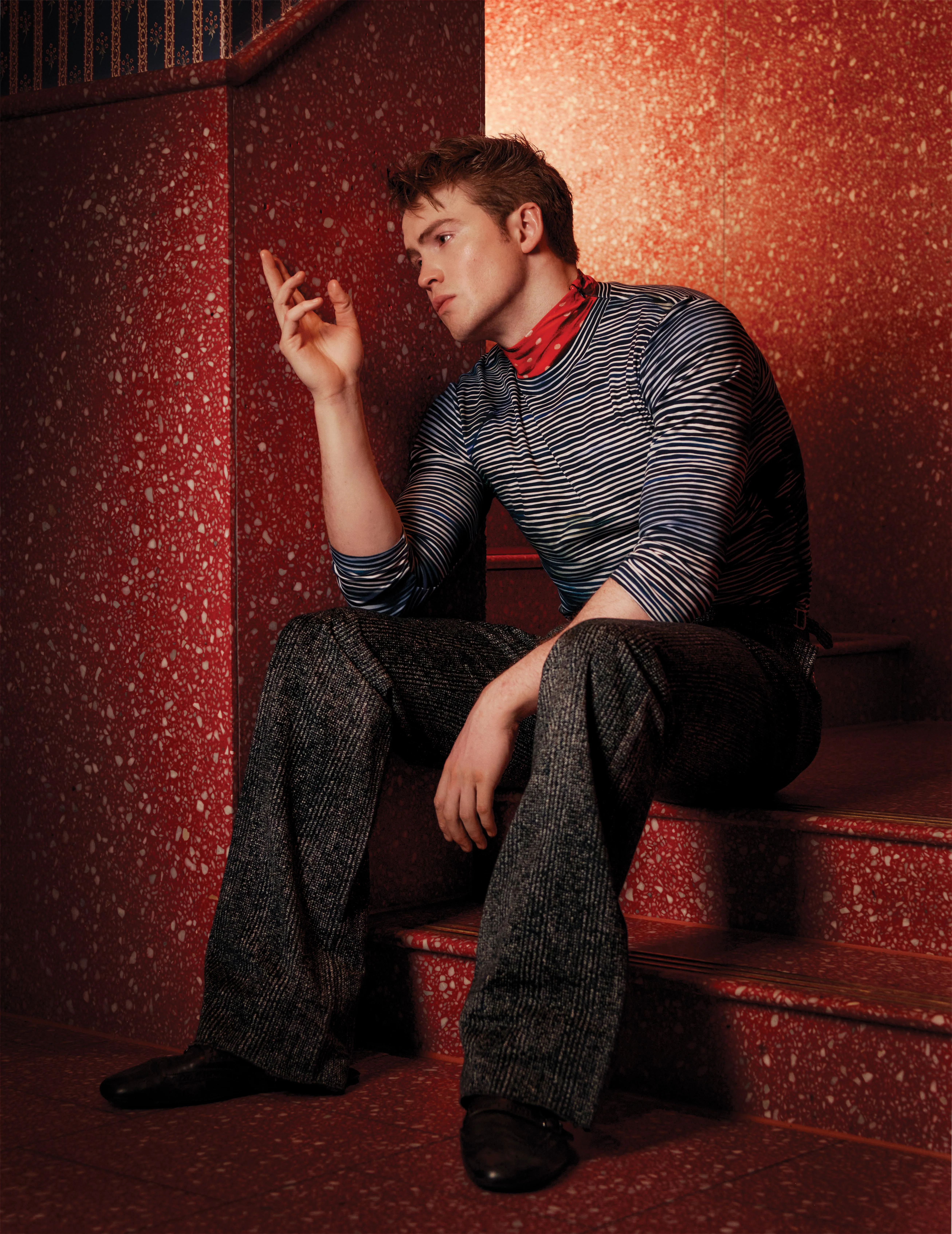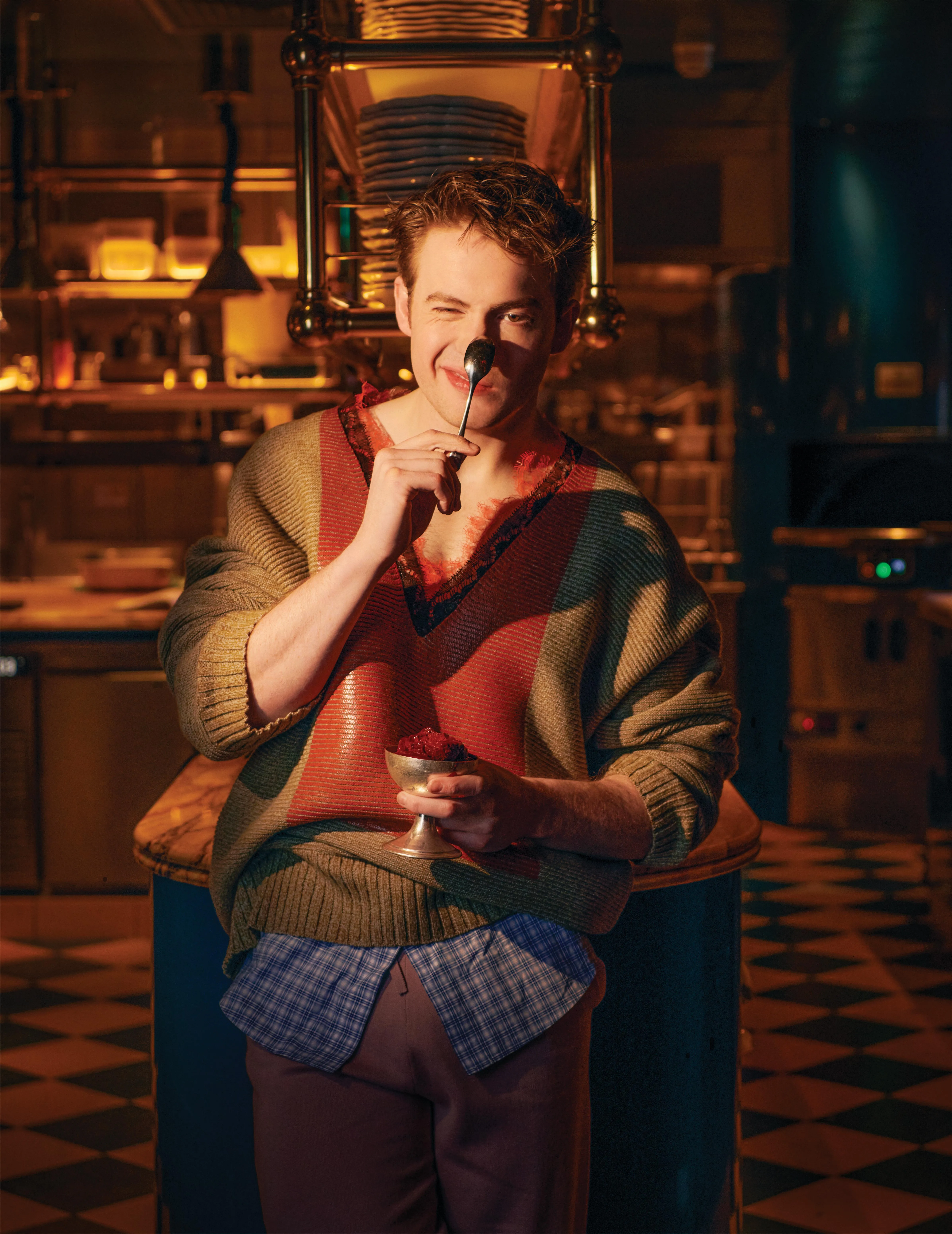F L A U N T


Kit Connor is enamored. When I greet him, he has the glow of someone in love, an infectious one, even through a Zoom screen. It’s a specific aura, not one necessarily linked to romance, but one felt from someone whose life is quickly changing and they don’t quite understand themselves to what extent yet. From the press tours, to the glowing love for his work on the queer, wry, coming-of-age British romance series Heartstopper, to the 6.1M follower banner splayed atop his Instagram page, Kit Connor is no newcomer to celebrity. Yet, there is a distinct feeling in his presence today that we are soon to meet Kit Connor, the movie star. As his stint as Romeo in Romeo + Juliet closes on Broadway and Warfare opens in theaters, Connor will have transitioned onto the other side.

I press Kit on what that moment was in his career when he knew things were beginning to change, that this would seal his fate as a performer and largely a vessel of the craft, a public servant to the masses. He explains, “The moment that I really decided that this was what I was going to do was when I did my first film around the age of nine—it made me feel like I’d never felt before, and that was the point where I thought, ‘Wow, I could really do this as a job.’”

And that he did: from an age when children still dream of becoming firemen and astronauts, Kit Connor has been acting. “I’ve worked with lots of really brilliant people,” he tells me, “but sometimes as a child actor, you’re almost afforded a little bit of leeway.” Though his childhood was punctuated by acting roles alongside adult actors, Connor feels that he’s matured into the position, without being pushed into maturity too early. “Rocketman (2019) was one of the first times where I felt particularly challenged as an actor. Same with Little Joe (2019),” he says. “When I started to take on these bigger projects, the weight of that was much heavier. You feel there are lots of people who are relying on you to do your job. That’s where I really found myself needing to apply the things that I’d learned over the last few years as an actor.”

Part of this maturity, for Connor, has arrived by way of theater roles. Notoriously, a stint on stage is a hallmark of a Serious Actor, one willing to take the emotional risks requisite of performing in front of a live audience. “My aim is to kind of just try and try loads of different things and widen my range as an actor and get better.Theater is one thing that forces you to do that,” he grins. “I think [it’s a necessary step in] the journey that I’ve taken throughout my career that I started as a child. I’ve been able to play lots of different roles, and work with and learn from lots of different people.” Connor speaks of his career as if it’s an ongoing lesson, graduating from one level to another, with no breaks and no ceiling.

In his most recent lesson, Connor learns from one of the quintessential schoolmasters: Romeo Montague. In Sam Gold’s buzzy iteration of the age-old play, the Gen Z appeal practically sneers at the audience in its obviousness—the play’s website landing page boasts the sly slogan “THE YOUTH ARE F**ED”; Connor plays opposite Rachel Zegler’s Juliet; and to top it all off, all of the show’s music is produced by generation-defining producer and prince of zillennial pop, Jack Antonoff. Certainly, Connor is a Romeo fit for the age of the internet. In all of its maximalism, Gold’s Romeo + Juliet refreshes the centuries-old archetype for Swifties and Snapchat users, but—isn’t that what Romeo + Juliet is about? Youth, love, longing? Shouldn’t young people be interested in a play that was written about them?

“When finding my version of Romeo, we had this goal to really play it like these kids are young. I was keen to not try to patronize the youth. It was a play made by the youth for the youth,” he says. “I thought, ‘I don’t want to infantilize [Romeo] by playing it too immature or youthful,’” Connor says. “But I think throughout the rehearsal process, the Romeo that I feel I discovered is very much in the writing. He is incredibly young and incredibly immature and horny. He’s excitable and flippant. He jumps from one thought to another and the play drives him. He doesn’t drive it. The events of the play just keep happening to him, and it’s really about his reactions to those things. So what I tried to bring to Romeo is this young man who is rejuvenated and reacting very dramatically to the things that happened to him, and feels things very strongly. He’s completely driven by those emotions.”


Connor does make the concession that the role was indeed, “a scary thought” at first, but he left the role feeling fulfilled. (Reviews called him a “standout,” “shining,” “sexy”) his meticulous enacting of the role, he says, is largely due to his thought process. “Depending on the job, I can be quite an obsessive actor. In the process of doing Romeo + Juliet and Warfare, it was an all-consuming thing where I thought about the roles a lot. I would go home and think about it...I would wake up and think about it...It was a constant thing. Even now, when I’m doing Romeo + Juliet, we’re weeks and weeks into the run, and yet I’ll still be lying awake at night thinking about different things that I can do in the scene.”

Connor makes a demonstrable commitment to the work he does, and possesses the courage to make any role he takes on profound and meaningful. His ability to blur the lines across genre and tone situates us in the sociopolitical moments he’s working in. Heartstopper opened a door for queer teenagers coming of age during the administrative whiplash following legalized gay marriage in America and the UK in the early 2010s. The show served as a sort of reassurance that things not only could work out, but would work out, with humor and grace. Conversely, Connor’s role as Tommy in Warfare, set to release in April, speaks to a specific moment in the world at present—conveying a sense of urgency in a war-driven security state. Set in 2006 Iraq, the A24 film follows a platoon of Navy SEALs on a mission through insurgent territory.

“It’s a difficult and scary time in the world,” Connor remarks, “but I think that the film is really about several things. In a lot of ways, it’s about this brotherhood between this group of young men and the trauma that they endured. We really put the audience through what it’s like to be there on the ground. It’s incredibly authentic and truthful. My hope is that people watch the film and see the weight and the side effects and consequences of war.”


Warfare’s subject matter sits heavy on both the audience and the cast not just because it observes the tragedies of war, but because the war that’s portrayed is likely one that they are old enough to remember. Instead of seeing the generation of our grandparents and great-grandparents, we see our parents, siblings, aunts, and uncles. The feat of embodying a reality that people remember as yesterday requires an ensemble cast willing to do that uncomfortable immersion work, and able to do it well.

Connor says, “Shooting Warfare was a time where I was suddenly a part of this collective of people who I think are some of the most talented up-and-coming young actors in the industry. I felt incredibly humbled to be a part of it, and I’ve been a fan of Alex Garland’s work for many years. To have him feel that I was even remotely capable of doing his and Ray Mendoza’s film was really special.” His gratitude and dedication to his work comes through. “I’ve had many moments like that over my career, where I like to say that every milestone feels like the biggest it’s ever going to be.And it never feels like this is a step on the ladder. Everything feels like the biggest thing that could ever happen to you.”

It could be said that Kit Connor only progresses forward. He learns more and more with each passing day, and each passing role. His hunger for this work makes him all the more cut out to keep taking on roles; to keep expanding his range; to do justice by each character he serves. Yet time spent with him assures anyone he’s not sloughing off what got him here, or setbacks that might have occurred in so doing. There’s a cadence to the ascent, and its strength is in humility and appreciation.


Photographed by Damian Foxe
Styled by Elad Bitton
Written by Laila Reshad
Grooming: Brady Lea at A-Frame Agency
Digital & Lighting: Finn Waring
Retouching: Love Retouch
Flaunt Film: Rodney Rico
Styling Assistant: Eden Molen
Location: The Broadwick Soho